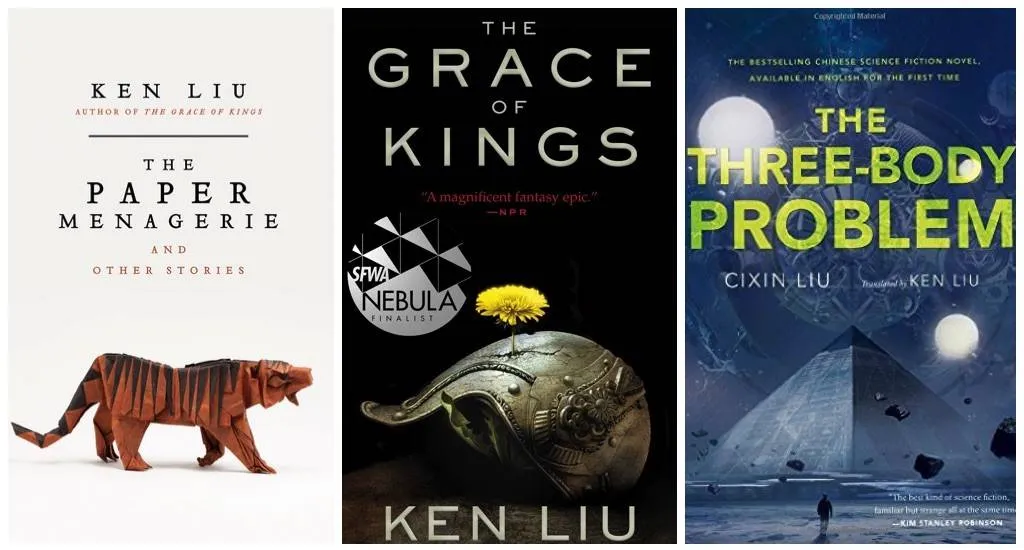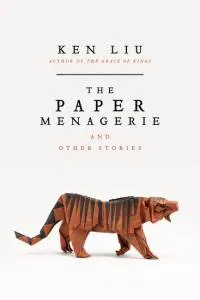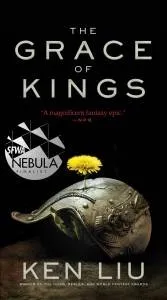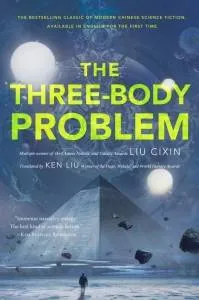
Reading Pathways: Ken Liu
This content contains affiliate links. When you buy through these links, we may earn an affiliate commission.
Ken Liu will be speaking at Book Riot Live 2016, November 12 and 13 in New York City.
Ken Liu has won the Nebula, Hugo, and World Fantasy awards, is writing an epic fantasy series, AND has translated one of the most popular science fiction novels in China. I don’t know how he finds time to do all of that, but I do know where you should start if you’re ready to dive into his work.
 The Paper Menagerie and Other Stories contains the first piece of his work I ever read, the title story “The Paper Menagerie.” Even upon rereads, it still has me tearing up — it’s a beautiful, heartbreaking mother-son story as well as an exploration of the first-generation American born experience, with a genius touch of magic. Many of the stories are heartbreakers, in fact; Liu doesn’t shy away from difficult subjects. War atrocities, heroic sacrifices, family tragedies, all are fair game. There are also parties, friendships, folktales, and meditations on culture and art. And to go with the wide-ranging subject matter is the wide range of style Liu has mastered. Hard sci-fi, magical realism, alternate history, time travel; each story inhabits its own corner of speculative fiction. “Mono No Aware” and “The Bookmaking Habits of Select Species” (my second favorite next to “Paper Menagerie”) take us to the stars, while “All the Flavors” takes us to the Western frontier. “The Perfect Match” ponders the possibilities of artificial intelligence and data collection; “The Regular” follows a hunt for a serial killer while looking to the future of body modification. This collection puts me in mind of my favorites from China Mieville or Ursula Le Guin — their imaginations leave few stones unturned.
Remember that epic fantasy series I mentioned earlier? It’s not just epic fantasy, it’s silkpunk! Liu says:
“Like steampunk, silkpunk is a blend of science fiction and fantasy. But while steampunk takes as its inspiration the chrome-brass-glass technology aesthetic of the Victorian era, silkpunk draws inspiration from classical East Asian antiquity.”
The Paper Menagerie and Other Stories contains the first piece of his work I ever read, the title story “The Paper Menagerie.” Even upon rereads, it still has me tearing up — it’s a beautiful, heartbreaking mother-son story as well as an exploration of the first-generation American born experience, with a genius touch of magic. Many of the stories are heartbreakers, in fact; Liu doesn’t shy away from difficult subjects. War atrocities, heroic sacrifices, family tragedies, all are fair game. There are also parties, friendships, folktales, and meditations on culture and art. And to go with the wide-ranging subject matter is the wide range of style Liu has mastered. Hard sci-fi, magical realism, alternate history, time travel; each story inhabits its own corner of speculative fiction. “Mono No Aware” and “The Bookmaking Habits of Select Species” (my second favorite next to “Paper Menagerie”) take us to the stars, while “All the Flavors” takes us to the Western frontier. “The Perfect Match” ponders the possibilities of artificial intelligence and data collection; “The Regular” follows a hunt for a serial killer while looking to the future of body modification. This collection puts me in mind of my favorites from China Mieville or Ursula Le Guin — their imaginations leave few stones unturned.
Remember that epic fantasy series I mentioned earlier? It’s not just epic fantasy, it’s silkpunk! Liu says:
“Like steampunk, silkpunk is a blend of science fiction and fantasy. But while steampunk takes as its inspiration the chrome-brass-glass technology aesthetic of the Victorian era, silkpunk draws inspiration from classical East Asian antiquity.”
 Welcome to The Grace of Kings, the first in the Dandelion Dynasty series. If you’ve read A Song of Ice and Fire, the Inheritance Trilogy by N.K. Jemisin, and/or David Anthony Durham’s Acacia series, this is in the same wheelhouse. Politics: check. Terrible decisions about life and love, often related to politics: check. Fearsome battles: check. Awesome world-building: check! There are monstrous sea creatures, torn alliances, star-crossed lovers, interfering deities, warring civilizations, you name it, rooted in East Asian narrative traditions including wuxia. This is particularly in my wheelhouse, as I rarely meet a martial arts film I don’t love, and getting that in book form is a real delight. Liu walks the fine line of keeping his characters human — there are no 100% good or 100% bad people here, only those convinced of their own righteousness. And while there is violence and gore aplenty, Grace of Kings also never approaches the murky depths of grimdark; it’s got a sharp, clean edge to it that I thoroughly enjoyed.
Welcome to The Grace of Kings, the first in the Dandelion Dynasty series. If you’ve read A Song of Ice and Fire, the Inheritance Trilogy by N.K. Jemisin, and/or David Anthony Durham’s Acacia series, this is in the same wheelhouse. Politics: check. Terrible decisions about life and love, often related to politics: check. Fearsome battles: check. Awesome world-building: check! There are monstrous sea creatures, torn alliances, star-crossed lovers, interfering deities, warring civilizations, you name it, rooted in East Asian narrative traditions including wuxia. This is particularly in my wheelhouse, as I rarely meet a martial arts film I don’t love, and getting that in book form is a real delight. Liu walks the fine line of keeping his characters human — there are no 100% good or 100% bad people here, only those convinced of their own righteousness. And while there is violence and gore aplenty, Grace of Kings also never approaches the murky depths of grimdark; it’s got a sharp, clean edge to it that I thoroughly enjoyed.
 As if that all wasn’t enough to be getting on with, Liu is also a translator and brought us the first in Cixin Liu’s Remembrance of Earth’s Past series, The Three-Body Problem, which won the 2006 Chinese Science Fiction Galaxy Award and the 2015 Hugo Award for Best Novel. The book is named for a well-known problem in physics and quantum mechanics, which you should Google if you want a coherent explanation because I was a Humanities major and skipped all the math and science I could. This should tip you off that Three-Body Problem is hard sci-fi in the classic sense: it’s deeply concerned with science and the search for extraterrestrial life. The story follows Wang Miao, a nanotech engineer, who has been asked by the government to infiltrate a cabal that appears to be driving scientists to suicide. Reaching back to China’s Cultural Revolution and looking forward to the limits of technology, Three-Body Problem is an incredible trip of a novel. Whether or not you can follow the specifics of the science (I often could not) it’s an incredible read, because like all good sci-fi the science is secondary to the story itself. It’s also a very sinister look at the possibilities of alien contact as well as humanity’s own history. If you love Asimov, Arthur C. Clarke, and Octavia Butler’s Xenogenesis series, this needs to be on your list. How does one even begin to translate a work like this? Liu discussed his thoughts on translation, as well as his other work, with US-China Today.
As if that all wasn’t enough to be getting on with, Liu is also a translator and brought us the first in Cixin Liu’s Remembrance of Earth’s Past series, The Three-Body Problem, which won the 2006 Chinese Science Fiction Galaxy Award and the 2015 Hugo Award for Best Novel. The book is named for a well-known problem in physics and quantum mechanics, which you should Google if you want a coherent explanation because I was a Humanities major and skipped all the math and science I could. This should tip you off that Three-Body Problem is hard sci-fi in the classic sense: it’s deeply concerned with science and the search for extraterrestrial life. The story follows Wang Miao, a nanotech engineer, who has been asked by the government to infiltrate a cabal that appears to be driving scientists to suicide. Reaching back to China’s Cultural Revolution and looking forward to the limits of technology, Three-Body Problem is an incredible trip of a novel. Whether or not you can follow the specifics of the science (I often could not) it’s an incredible read, because like all good sci-fi the science is secondary to the story itself. It’s also a very sinister look at the possibilities of alien contact as well as humanity’s own history. If you love Asimov, Arthur C. Clarke, and Octavia Butler’s Xenogenesis series, this needs to be on your list. How does one even begin to translate a work like this? Liu discussed his thoughts on translation, as well as his other work, with US-China Today.
 The Paper Menagerie and Other Stories contains the first piece of his work I ever read, the title story “The Paper Menagerie.” Even upon rereads, it still has me tearing up — it’s a beautiful, heartbreaking mother-son story as well as an exploration of the first-generation American born experience, with a genius touch of magic. Many of the stories are heartbreakers, in fact; Liu doesn’t shy away from difficult subjects. War atrocities, heroic sacrifices, family tragedies, all are fair game. There are also parties, friendships, folktales, and meditations on culture and art. And to go with the wide-ranging subject matter is the wide range of style Liu has mastered. Hard sci-fi, magical realism, alternate history, time travel; each story inhabits its own corner of speculative fiction. “Mono No Aware” and “The Bookmaking Habits of Select Species” (my second favorite next to “Paper Menagerie”) take us to the stars, while “All the Flavors” takes us to the Western frontier. “The Perfect Match” ponders the possibilities of artificial intelligence and data collection; “The Regular” follows a hunt for a serial killer while looking to the future of body modification. This collection puts me in mind of my favorites from China Mieville or Ursula Le Guin — their imaginations leave few stones unturned.
Remember that epic fantasy series I mentioned earlier? It’s not just epic fantasy, it’s silkpunk! Liu says:
“Like steampunk, silkpunk is a blend of science fiction and fantasy. But while steampunk takes as its inspiration the chrome-brass-glass technology aesthetic of the Victorian era, silkpunk draws inspiration from classical East Asian antiquity.”
The Paper Menagerie and Other Stories contains the first piece of his work I ever read, the title story “The Paper Menagerie.” Even upon rereads, it still has me tearing up — it’s a beautiful, heartbreaking mother-son story as well as an exploration of the first-generation American born experience, with a genius touch of magic. Many of the stories are heartbreakers, in fact; Liu doesn’t shy away from difficult subjects. War atrocities, heroic sacrifices, family tragedies, all are fair game. There are also parties, friendships, folktales, and meditations on culture and art. And to go with the wide-ranging subject matter is the wide range of style Liu has mastered. Hard sci-fi, magical realism, alternate history, time travel; each story inhabits its own corner of speculative fiction. “Mono No Aware” and “The Bookmaking Habits of Select Species” (my second favorite next to “Paper Menagerie”) take us to the stars, while “All the Flavors” takes us to the Western frontier. “The Perfect Match” ponders the possibilities of artificial intelligence and data collection; “The Regular” follows a hunt for a serial killer while looking to the future of body modification. This collection puts me in mind of my favorites from China Mieville or Ursula Le Guin — their imaginations leave few stones unturned.
Remember that epic fantasy series I mentioned earlier? It’s not just epic fantasy, it’s silkpunk! Liu says:
“Like steampunk, silkpunk is a blend of science fiction and fantasy. But while steampunk takes as its inspiration the chrome-brass-glass technology aesthetic of the Victorian era, silkpunk draws inspiration from classical East Asian antiquity.”
 Welcome to The Grace of Kings, the first in the Dandelion Dynasty series. If you’ve read A Song of Ice and Fire, the Inheritance Trilogy by N.K. Jemisin, and/or David Anthony Durham’s Acacia series, this is in the same wheelhouse. Politics: check. Terrible decisions about life and love, often related to politics: check. Fearsome battles: check. Awesome world-building: check! There are monstrous sea creatures, torn alliances, star-crossed lovers, interfering deities, warring civilizations, you name it, rooted in East Asian narrative traditions including wuxia. This is particularly in my wheelhouse, as I rarely meet a martial arts film I don’t love, and getting that in book form is a real delight. Liu walks the fine line of keeping his characters human — there are no 100% good or 100% bad people here, only those convinced of their own righteousness. And while there is violence and gore aplenty, Grace of Kings also never approaches the murky depths of grimdark; it’s got a sharp, clean edge to it that I thoroughly enjoyed.
Welcome to The Grace of Kings, the first in the Dandelion Dynasty series. If you’ve read A Song of Ice and Fire, the Inheritance Trilogy by N.K. Jemisin, and/or David Anthony Durham’s Acacia series, this is in the same wheelhouse. Politics: check. Terrible decisions about life and love, often related to politics: check. Fearsome battles: check. Awesome world-building: check! There are monstrous sea creatures, torn alliances, star-crossed lovers, interfering deities, warring civilizations, you name it, rooted in East Asian narrative traditions including wuxia. This is particularly in my wheelhouse, as I rarely meet a martial arts film I don’t love, and getting that in book form is a real delight. Liu walks the fine line of keeping his characters human — there are no 100% good or 100% bad people here, only those convinced of their own righteousness. And while there is violence and gore aplenty, Grace of Kings also never approaches the murky depths of grimdark; it’s got a sharp, clean edge to it that I thoroughly enjoyed.
 As if that all wasn’t enough to be getting on with, Liu is also a translator and brought us the first in Cixin Liu’s Remembrance of Earth’s Past series, The Three-Body Problem, which won the 2006 Chinese Science Fiction Galaxy Award and the 2015 Hugo Award for Best Novel. The book is named for a well-known problem in physics and quantum mechanics, which you should Google if you want a coherent explanation because I was a Humanities major and skipped all the math and science I could. This should tip you off that Three-Body Problem is hard sci-fi in the classic sense: it’s deeply concerned with science and the search for extraterrestrial life. The story follows Wang Miao, a nanotech engineer, who has been asked by the government to infiltrate a cabal that appears to be driving scientists to suicide. Reaching back to China’s Cultural Revolution and looking forward to the limits of technology, Three-Body Problem is an incredible trip of a novel. Whether or not you can follow the specifics of the science (I often could not) it’s an incredible read, because like all good sci-fi the science is secondary to the story itself. It’s also a very sinister look at the possibilities of alien contact as well as humanity’s own history. If you love Asimov, Arthur C. Clarke, and Octavia Butler’s Xenogenesis series, this needs to be on your list. How does one even begin to translate a work like this? Liu discussed his thoughts on translation, as well as his other work, with US-China Today.
As if that all wasn’t enough to be getting on with, Liu is also a translator and brought us the first in Cixin Liu’s Remembrance of Earth’s Past series, The Three-Body Problem, which won the 2006 Chinese Science Fiction Galaxy Award and the 2015 Hugo Award for Best Novel. The book is named for a well-known problem in physics and quantum mechanics, which you should Google if you want a coherent explanation because I was a Humanities major and skipped all the math and science I could. This should tip you off that Three-Body Problem is hard sci-fi in the classic sense: it’s deeply concerned with science and the search for extraterrestrial life. The story follows Wang Miao, a nanotech engineer, who has been asked by the government to infiltrate a cabal that appears to be driving scientists to suicide. Reaching back to China’s Cultural Revolution and looking forward to the limits of technology, Three-Body Problem is an incredible trip of a novel. Whether or not you can follow the specifics of the science (I often could not) it’s an incredible read, because like all good sci-fi the science is secondary to the story itself. It’s also a very sinister look at the possibilities of alien contact as well as humanity’s own history. If you love Asimov, Arthur C. Clarke, and Octavia Butler’s Xenogenesis series, this needs to be on your list. How does one even begin to translate a work like this? Liu discussed his thoughts on translation, as well as his other work, with US-China Today.








